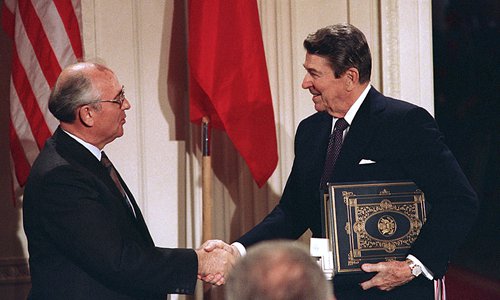With a relatively modest nuclear arsenal, China should stay away from INF treaty

Soviet leader Mikhail Gorbachev (left) shakes hands with US president Ronald Reagan on December 8, 1987 after they signed the Intermediate-Range Nuclear Forces Treaty. Photo: IC
Editor's Note:
Friday marks the end of a six-month withdrawal period since the Trump administration decided to suspend US obligations related to the Intermediate-range Nuclear Forces (INF) Treaty. What does the breakdown of the INF treaty mean for Russia-US ties and the world? The US is seeking a new arms control treaty that also includes China, why will China not join an internationalized INF-style treaty? Global Times talked to two Chinese scholars on these issues.
Fan Jun, an expert on arms control
With the INF treaty dissolved on Friday, the future of New START (Strategic Arms Reduction Treaty), the sole remaining nuclear arms reduction treaty between Russia and the US, is in doubt. This is an issue that deserves more attention. The New START expires in 2021, if an agreement cannot be reached over an extension to the existing treaty, there will be no limits on the nuclear arsenals of Russia and the US in the coming years.
The US and Soviet Union were embroiled in an arms race during the Cold War years, then they reached a string of treaties on arms control and established dialogue platforms and mechanisms to implement the treaties. This contributes to the strategic stability between Washington and Moscow. If all those treaties and mechanisms vanish, bilateral strategic stability will be severely impacted.
The US and Russia control over 90 percent of the world's nuclear arsenal. People expect to see the number of nuclear weapons decline. But with the US and Russia freeing themselves from the INF treaty obligations, prospects of a continuing negotiated reduction in both countries' nuclear weapons become increasingly dim. What influences will it have on other countries with smaller nuclear arsenals? It remains to be seen.
According to US media, the US is not interested in renewing the New START and is seeking to purse a new arms control treaty that will also include China. Chinese Foreign Ministry spokesperson Geng Shuang stated that China sees no grounds for its participation in arms control negotiations between Russia and the US.
China has staunchly pursued a nuclear strategy for self-defense. It has committed to no first use of nuclear weapons at any time or under any circumstance, nor would it participate in a nuclear arms race of any kind. China's nuclear policy has remained unchanged over the past few decades, which is rare among nuclear powers.
China is different from the US and Russia in terms of the purpose of nuclear weapons development, the size of nuclear arsenals and the way they are deployed. Besides, China's nuclear arsenal is much smaller than that of the US and Russia. There is no reason to draw China into the treaty between the two powers.
In addition, judging from the US propensity of withdrawing from international organizations and treaties, other countries have every reason to question Washington's sincerity to talks in negotiations given its current policy inclinations and steps on arms control. How can one believe that Washington is serious about talks?
Wu Riqiang, associate professor at the School of International Studies of Renmin University of China
US National Security said the main reason for Washington's withdrawal is that Moscow violated the treaty by continuing to develop advanced ballistic and hypersonic delivery systems to modernize its arsenal. Another factor is that China has not joined the INF treaty and has been developing missiles which the US could not.
In fact, Washington has pulled out of the treaty because it does not intend to follow the accord. Accusing Moscow of violating the treaty is just a pretext. Considerations on China may contribute more to the US determination to withdraw from the treaty, because the world's second-largest economy has become an increasingly important competitor of the US, as the quality of China's missiles improves and their strategic value rises.
The dissolution of the INF treaty could trigger a fresh arms race. The fundamental premise of nuclear arms control is strategic stability, namely mutual vulnerability. Washington wants to abandon mutual vulnerability to pursue absolute military security. In that case, however, other countries, especially great nuclear powers, may devote more to develop nuclear weapons in response to such US strategy. But the potential arms race would not see levels reached during the Cold War.
The potential arms race will escalate tensions among great powers, especially between China and the US. Washington will deploy more land-based intermediate range missiles in East Asia to deter Beijing, which will certainly trigger strong resistance from China.
Some countries have urged China to become part of INF treaty. China Tuesday reiterated its opposition to the multilateralization of the INF.
China should not join the treaty. The strategic environment of the East Asian giant is different from that of the US and Russia. The region needs to retain intermediate-range nuclear missiles. None of the US neighboring countries have nuclear weapons. In terms of Russia, it possesses a large amount of potent armaments, such as tactical nuclear weapons, to deter surrounding countries. However, four of China's land neighbors possess nuclear weapons. Land-based missiles are a major component of China's nuclear deterrent, and they cannot be abandoned.
Conventional intermediate-range nuclear missiles are crucial for China to defend national security, which cannot be replaced in the short term.
Newspaper headline: China’s missiles trajectory innocuous